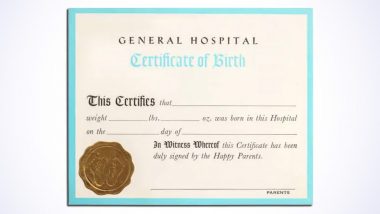New Delhi, September 14: The Registration of Births and Deaths (Amendment) Act, 2023, is set to come into force on October 1, bringing significant changes to birth certificate registration in India. This act allows the use of a birth certificate as a single document for various purposes, including admission to educational institutions, obtaining a driving license, voter registration, Aadhaar enrollment, marriage registration, and government job applications.
Under the Civil Registration System (CRS) of India, birth registration is mandatory for all citizens. The Registration of Births and Deaths Act, 1969, makes it compulsory to register births, deaths, and stillbirths across the country. The responsibility of implementing this act lies with the state governments, which frame their rules based on guidelines provided by the Registrar General of India. To help citizens navigate this new system, here is a comprehensive guide on how to apply for a birth certificate and the essential documents required. Birth Certificate To Be Used as Single Document for School Admission, Govt Job Appointment, Aadhaar Card and Other Works From October 1.
Issuance of Birth Certificates
The concerned local authorities, such as the Municipal Corporation in urban areas or the Tehsildar or Gram Panchayat Office in rural areas, issue birth certificates. The certificate is essential for various purposes, including age verification, claiming social security benefits, obtaining documents like driving licenses and passports and securing admission to educational institutions and government jobs. Birth Certificate to Be Single Document for Aadhaar, Admission in Education Institutes, Other Sectors from October 1.
How to Get A Birth Certificate
- Download Registration Form: Obtain a Birth Certificate Registration Form online through the official website crsorgi.gov.in or from the hospital if the child is born there.
- Complete the Form: Fill in the form within 21 days of the child's birth, providing accurate details, including date, time, place of birth, parents' ID proof, and nursing home details.
- Verification: Once submitted, the registrar verifies the birth records.
- Processing Time: Typically, authorities take up to seven days to issue a birth certificate.
Required Set of Documents
The required documents for a birth certificate application in India may vary slightly from state to state but generally include the Birth Certificate Registration Form, which can be obtained either online through the official government website or from the hospital where the child was born. If the child was born in a hospital or nursing home, you will need a proof of birth letter issued by the medical officer in charge. Copies of the birth certificates of both parents are typically required. If the child's parents are married, one needs a copy of their marriage certificate.
Provide identification documents such as Aadhar cards, Voter IDs, or any other government-issued photo identification. Proof of the parents' residential address may also be necessary, such as a utility bill or a rental agreement. An affidavit may be required, confirming the accuracy of the information provided in the birth registration form. In case the child was not born in a hospital, an exhibit from the Gram Panchayat, city councillor, or an MBBS doctor stating the child's name, father's name, residential address, date of birth, and bearing the authority's signature and seal may be accepted instead.
Late Registration
If birth registration is not done within 21 days, a late fee may be applicable, but registration can still be completed. Beyond one year, birth registration can only be done by a magistrate after verifying the birth date.
Registration of Child Born Outside India
For children born outside India, birth registration follows the provisions of the Citizenship Act 1955 and Citizens (Registration at Indian consulates) Rules, 1956. If parents return to India, registration should occur within 60 days of the child's arrival.
In conclusion, birth certificate registration is essential to ensure a child's rights and identity. With the new act in place, accessing these benefits has become more straightforward. Whether born in a hospital or not, following the proper procedures ensures that every child gets their rightful identity and citizenship documentation.
(The above story first appeared on LatestLY on Sep 14, 2023 02:57 PM IST. For more news and updates on politics, world, sports, entertainment and lifestyle, log on to our website latestly.com).













 Quickly
Quickly


